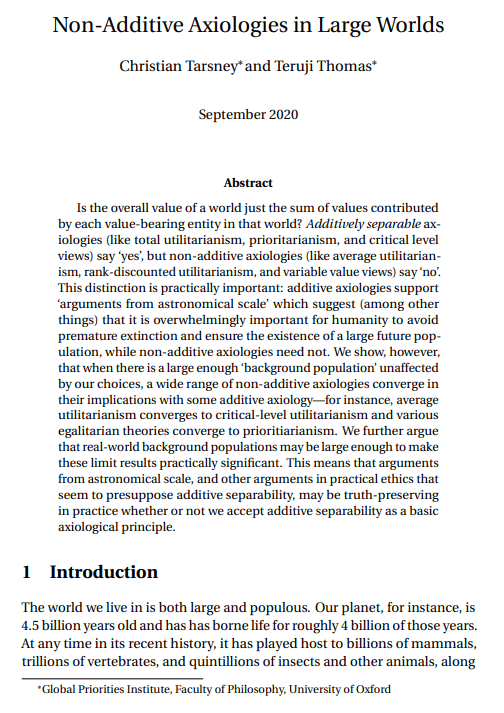Non-additive axiologies in large worlds
Christian Tarsney and Teruji Thomas (Global Priorities Institute, Oxford University)
GPI Working Paper No. 9-2020, forthcoming at Ergo.
Is the overall value of a world just the sum of values contributed by each value-bearing entity in that world? Additively separable axiologies (like total utilitarianism, prioritarianism, and critical level views) say ‘yes’, but non-additive axiologies (like average utilitarianism, rank-discounted utilitarianism, and variable value views) say ‘no’. This distinction is practically important: among other things, additive axiologies generally assign great importance to large changes in population size, and therefore tend to support strongly prioritizing the long-term survival of humanity over the interests of the present generation. Non-additive axiologies, on the other hand, need not support this kind of reasoning. We show, however, that when there is a large enough ‘background population’ unaffected by our choices, a wide range of non-additive axiologies converge in their implications with some additive axiology—for instance, average utilitarianism converges to critical-level utilitarianism and various egalitarian theories converge to prioritiarianism. We further argue that real-world background populations may be large enough to make these limit results practically significant. This means that arguments from the scale of potential future populations for the astronomical importance of avoiding existential catastrophe, and other arguments in practical ethics that seem to presuppose additive separability, may succeed in practice whether or not we accept additive separability as a basic axiological principle.
Other working papers
Consciousness makes things matter – Andrew Y. Lee (University of Toronto)
This paper argues that phenomenal consciousness is what makes an entity a welfare subject, or the kind of thing that can be better or worse off. I develop and motivate this view, and then defend it from objections concerning death, non-conscious entities that have interests (such as plants), and conscious subjects that necessarily have welfare level zero. I also explain how my theory of welfare subjects relates to experientialist and anti-experientialist theories of welfare goods.
The weight of suffering – Andreas Mogensen (Global Priorities Institute, University of Oxford)
How should we weigh suffering against happiness? This paper highlights the existence of an argument from intuitively plausible axiological principles to the striking conclusion that in comparing different populations, there exists some depth of suffering that cannot be compensated for by any measure of well-being. In addition to a number of structural principles, the argument relies on two key premises. The first is the contrary of the so-called Reverse Repugnant Conclusion…
Philosophical considerations relevant to valuing continued human survival: Conceptual Analysis, Population Axiology, and Decision Theory – Andreas Mogensen (Global Priorities Institute, University of Oxford)
Many think that human extinction would be a catastrophic tragedy, and that we ought to do more to reduce extinction risk. There is less agreement on exactly why. If some catastrophe were to kill everyone, that would obviously be horrific. Still, many think the deaths of billions of people don’t exhaust what would be so terrible about extinction. After all, we can be confident that billions of people are going to die – many horribly and before their time – if humanity does not go extinct. …

